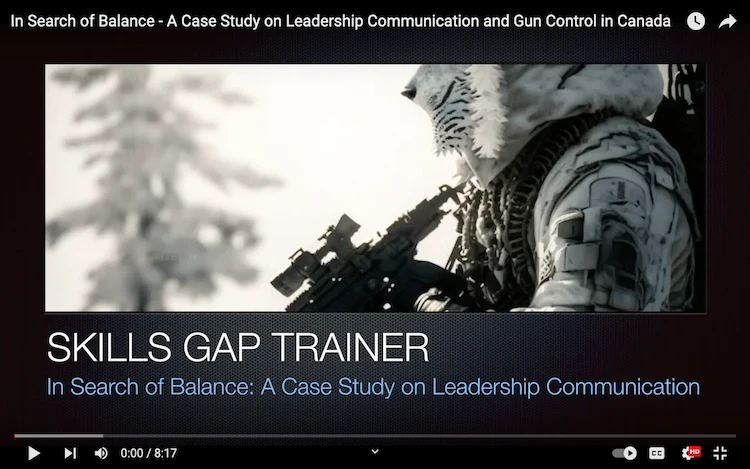Video: In Search of Balance – A Case Study on Leadership Communication and Gun Control in Canada
YouTube Link: https://youtu.be/B_xe269owYY
This case study delves into a compelling open letter addressed to Mr. Marco Mendicino, a figure dedicated to public safety and the well-being of Canadians. In the heart of the letter lies a complex, emotionally charged issue – gun control. Through its respectful and insightful approach, this letter serves as a unique exploration of leadership psychology principles, conflict resolution strategies, and negotiation tactics. It illustrates how one can advocate for their beliefs, even in contentious areas, while acknowledging and respecting the opposing perspectives. This case study will highlight how the letter communicates these elements and fosters an environment conducive to open dialogue and constructive discussion. In doing so, it encapsulates a variety of leadership lessons, inspiring readers to act authentically and lead effectively, regardless of the challenges they may face.
Video: Liberals announce new amendments to Bill C-21
YouTube Link: https://youtu.be/hRyEH8WfE9I
Dear Mr. Mendicino, we write to you today with deep respect for your dedication to public safety and the well-being of our fellow Canadians. We understand that the issue of gun control is a complex and emotionally charged one, with strong arguments on both sides. However, we believe that there is a unique aspect to the Canadian experience which should be considered when evaluating the overall impact of firearms in our society.
Throughout history, there have been ongoing instances of mass atrocities committed by oppressive regimes, often correlating to gun control legislation enhancements. We acknowledge that Canada has been fortunate enough not to face such dire circumstances, and we attribute this, in part, to the responsible gun ownership culture within our nation. Our firearms owners, although not directly involved in public safety as law enforcement or military personnel, as is done in other countries like in Europe, contribute to a broader sense of security and vigilance that permeates our communities. Furthermore, they may one day become public safety, military, or police volunteers or members in the future, further strengthening our nation’s safety.
It’s important to strike a balance when it comes to gun control. An absence of guns is not ideal, just as an oversaturated market, such as in the United States, can lead to negative consequences. Canada has managed to find a centrist approach, which has proven to be effective thus far in maintaining public safety.
Now, here’s where the irony comes in: It’s quite interesting that you, Mr. Mendicino, embody many of the admirable qualities we associate with responsible firearms owners – tenacity, spirit, warrior ethos, and military resolve, unwavering commitment to the well-being of Canadians. Yet, you’ve been working to disarm the very group that shares these attributes, exposing our country to a great risk of national security, national safety, recreational business failure, hunting community failure, sports shooting failure, firearms business failure, tourism business failure, domestic security force potential failure, and budget failure due to the need to compensate confiscation practices. This non-centrist approach to gun ownership is setting the tone of Canadian society as one of “the government” versus “the people”, instead of “the government of and with the people”. We do not need the gun policy the United States, or the gun policy of Russia or of China! Our moderate approach, that we have now, is far superior to those extreme positions and results.
To see our Donate Page, click https://skillsgaptrainer.com/donate
To see our Instagram Channel, click https://www.instagram.com/skillsgaptrainer/
To see some of our Udemy Courses, click SGT Udemy Page
To see our YouTube Channel, click https://www.youtube.com/@skillsgaptrainer

